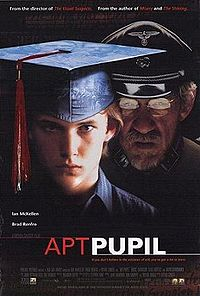 This 1998 Stephen King adaptation is a highly underrated film that deserves a reconsideration. Despite a less than satisfying fade-out it’s compelling and genuinely chilling, and certainly one of the finest films ever directed by Bryan Singer.
This 1998 Stephen King adaptation is a highly underrated film that deserves a reconsideration. Despite a less than satisfying fade-out it’s compelling and genuinely chilling, and certainly one of the finest films ever directed by Bryan Singer.
The novella “Apt Pupil” was first published in Stephen King’s 1982 anthology DIFFERENT SEASONS (which also provided the source material for STAND BY ME and THE SHAWSHANK REDEMPTION). It told the chilling story of a preteen boy who becomes unhealthily obsessed with an aging Nazi war criminal living in his neighborhood.
APT PUPIL was initially adapted for film in the late 1980s with Nicole Williamson and Rick Schroeder headlining, but the production ran out of money and was shut down after ten weeks. This second filming of the material was by director Bryan Singer, following his mega-successful 1995 indie THE USUAL SUSPECTS.
Singer’s APT PUPIL attracted some brief controversy prior to its 1998 release because of a lawsuit filed by underage extras, who alleged that Singer had mistreated them during a group shower sequence, and wasn’t much of a success critically or financially. It is, however, far superior to Singer’s better-known (and more conventional) Nazi-themed drama VALKYRIE from 2008.
Todd is an all-American boy living in a small town circa 1985. He comes to realize that Kurt Dussander, an escaped Nazi, is residing in the neighborhood under an assumed identity, and one day Todd plucks up the courage to knock on the old man’s door. Driven by an unhealthy fascination with Dussander’s past, Todd blackmails him into revealing some of the more unpleasant details of his tenure as a Nazi during WWII. Dussander’s revelations are so disturbing that Todd is unable to sleep at night, and his grades slip. Dussander offers to personally see that Todd’s schoolwork improves, and so draws the boy into a danse macabre.
In the process Todd finds himself becoming increasingly Nazi-like, just as Dussander slips back into his former role of cold-blooded murderer. He lures a bum into his basement and kills him—or thinks he does. It’s actually Todd who administers the killing blow, thus unwittingly bonding himself with Dussander forevermore.
Yet on the night of the killing Dussander has a heart attack and winds up hospitalized. There a Jewish holocaust survivor recognizes Dussander and alerts the authorities. This effectively ends Dussander’s reign, but his malevolent influence on Todd stretches on.
Bryan Singer’s movies tend to be loud and flashy (see THE USUAL SUSPECTS and X-MEN), but APT PUPIL is powerful mostly because it’s so unnervingly restrained. There are some extremely glitzy moments, yes (in particular the kinetic intercutting of the climax), and some genuinely scary ones (the scene where one of Dussander’s victims recognizes him in the hospital is a stunner), but it’s the performances that occupy center stage, notably the impacting lead turns by the late Brad Renfro as Todd and a never-better Ian McKellan as the Nazi.
Where the film could be better is in its scripting. Some of the narrative faults were bequeathed by Stephen King’s source novella, which failed to adequately explain the nature of Todd’s obsession with the neighborhood Nazi. The screenplay by Brandon Boyce likewise gives us little insight into the boy’s actions (the universality-of-evil concept is insufficient). Worst of all, though, is the ending.
King’s original conclusion, conveyed in possibly the most chilling final lines I’ve ever encountered, saw Todd embark on a killing spree before being shot by police. Boyce and Singer’s new ending, while admirably uncompromising, is pared down and de-balled considerably. No, it doesn’t blunt the impact of the rest of the film, but does close it out in unsatisfying fashion.
Vital Statistics
APT PUPIL
Phoenix Pictures
Director: Bryan Singer
Producers: Jane Hamsher, Don Murphy, Bryan Singer
Screenplay: Brandon Boyce
(Based on a novella by Stephen King)
Cinematography: Newton Thomas Sigel
Editing: John Ottman
Cast: Ian McKellan, Brad Renfro, Elias Koteas, Bruce Davison, David Schwimmer, Joshua Jackson, Joe Morton, Mickey Cottrell, Ann Dowd, James Karen, Marjorie Lovett
